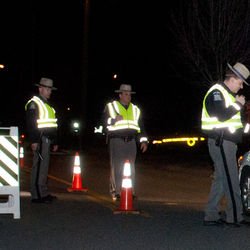Albany, NY - August 20, 2015 - Governor Cuomo directed New York State Police to ramp up enforcement efforts as part of a national crackdown on impaired driving. The 20-day campaign, Drive Sober or Get Pulled Over, runs from Aug. 21 to Sept. 7 (Labor Day) and is aimed at significantly reducing deaths and injuries caused by motorists driving drunk or impaired by drugs. The New York State Police, together with the important work of local law enforcement, will be vigilant in screening for impaired drivers.
"Driving drunk is both reckless and selfish, and we have seen too far too many avoidable tragedies that occurred after someone got behind the wheel when they shouldn’t have,” Governor Cuomo said. “I urge all New Yorkers to drive responsibly, and want everyone to know that impaired driving will not be tolerated in this state.”
The Governor’s Traffic Safety Committee 2014 annual report found that while the number of alcohol-related crash injuries were down in New York State by nearly 800 over a five-year period starting in 2009, 364 people were killed in such crashes in 2013 and about 30 percent of New York’s crash fatalities are alcohol-related. Additionally, according to the National Highway Traffic Safety Administration, 10,076 people were killed nationwide in crashes involving a driver with a blood-alcohol concentration (BAC) of .08 percent or higher 2013.
In New York State, .08 percent BAC is the legal threshold for driving while intoxicated, but many offenders are arrested at nearly twice that level: statewide, the average BAC of those arrested for alcohol-impaired driving is more than .14. Alcohol, however, is just one substance contributing to traffic fatalities. Drugs other than alcohol, such as marijuana and cocaine, are a factor in about 18 percent of motor vehicle driver deaths, the National Highway Traffic Safety Administration says.
Terri Egan, Executive Deputy Commissioner of the New York State Department of Motor Vehicles, said, “DMV, the Governor's Traffic Safety Committee, and law enforcement partners across the state work diligently year-round to raise awareness of the dangers of impaired driving, but it takes more than that: we need all New Yorkers to drive sober, and understand the deadly consequences such behavior can have. I urge all motorists to stay safe and to protect themselves and their neighbors on the road by driving free of impairments; regardless if those impairments are from alcohol, prescription or illicit drugs.”
Even when drunk or impaired driving does not end in death or injury, its effects are particularly costly. The National Highway Traffic Safety Administration estimates that the annual economic cost of alcohol-related motor vehicle traffic crashes in the United States totals $49.8 billion.
In June 2015, Governor Cuomo announced that New York State had kept more than 7,500 repeat offenders off the road since implementing tougher DWI regulations in September 2012. Those individuals were denied relicensing either permanently or for an additional five years for having three or more alcohol or drug-related driving offenses on their record. As of July 31, the number has risen to more than 8,000.
Also in June, Governor Cuomo announced a statewide multi-media campaign, “Impaired Drivers Take Lives. Think,” using billboards, radio, television and social media to remind motorists about the deadly impacts of impaired driving. As part of the campaign, the Governor's Traffic Safety Committee produced a 30-second public service announcement that can be seen on television and viewed on YouTube.
On November 1, 2014, even stronger penalties were enacted in New York to deter impaired driving. Drivers convicted of DWI or DWAI three or more times in 15 years face a Class D felony charge, up to seven years in prison, and a fine up to $10,000.
New York State Police Superintendent Joseph A. D'Amico said, “Driving while impaired is a bad decision that often results in injury, death and heartache. We encourage people to enjoy these final few weeks of summer, but please make the right decision and drive sober. State Troopers and our law enforcement partners work each and every day to keep impaired drivers off our roads, and anyone who is caught driving after drinking or using drugs will be arrested.”
Chuck DeWeese, Assistant Commissioner of the Governor's Traffic Safety Committee, said, “The decrease in alcohol-related crashes is encouraging, but the bad news is that crashes caused by prescription and illegal drugs are on the rise. Impaired driving, whether it is due to alcohol or drugs, is deadly, and we will continue to use every resource available to deter this dangerous behavior to help make our roads as safe as possible for everyone.”
Peter Kehoe, Executive Director of the New York State Sheriffs' Association, said, “The law enforcement and traffic safety communities have made great strides in reducing the number of people killed and maimed by drunk drivers. However far too many people still make the foolish choice to get behind the wheel drunk. We urge you don't be one of them. A DWI arrest could really ruin your day!”
Margaret Ryan, Executive Director of the NYS Association of Chiefs of Police, said, “Drunk driving is no accident nor is it a victimless crime. Each year thousands of lives are lost as a result of motorists operating vehicles while their ability is impaired. That is why the NYS Association of Chiefs of Police and its law enforcement professionals fully support these high visibility enforcement efforts that will deter and remove impaired drivers from our highways and reduce needless fatalities. Along with our partners we will make every effort to ensure all travelers have a safe and enjoyable holiday weekend."
New York’s anti-impaired driving enforcement campaigns are funded by the Governor's Traffic Safety Committee and STOP-DWI, a comprehensive and financially self-sustaining highway safety program that allows participating counties to qualify for the return of all fines collected for alcohol and other drug-related traffic offenses.
To learn more about the risks of impaired driving and for traffic safety tips, visit the DMV website and the Governor's Traffic Safety Committee website.










